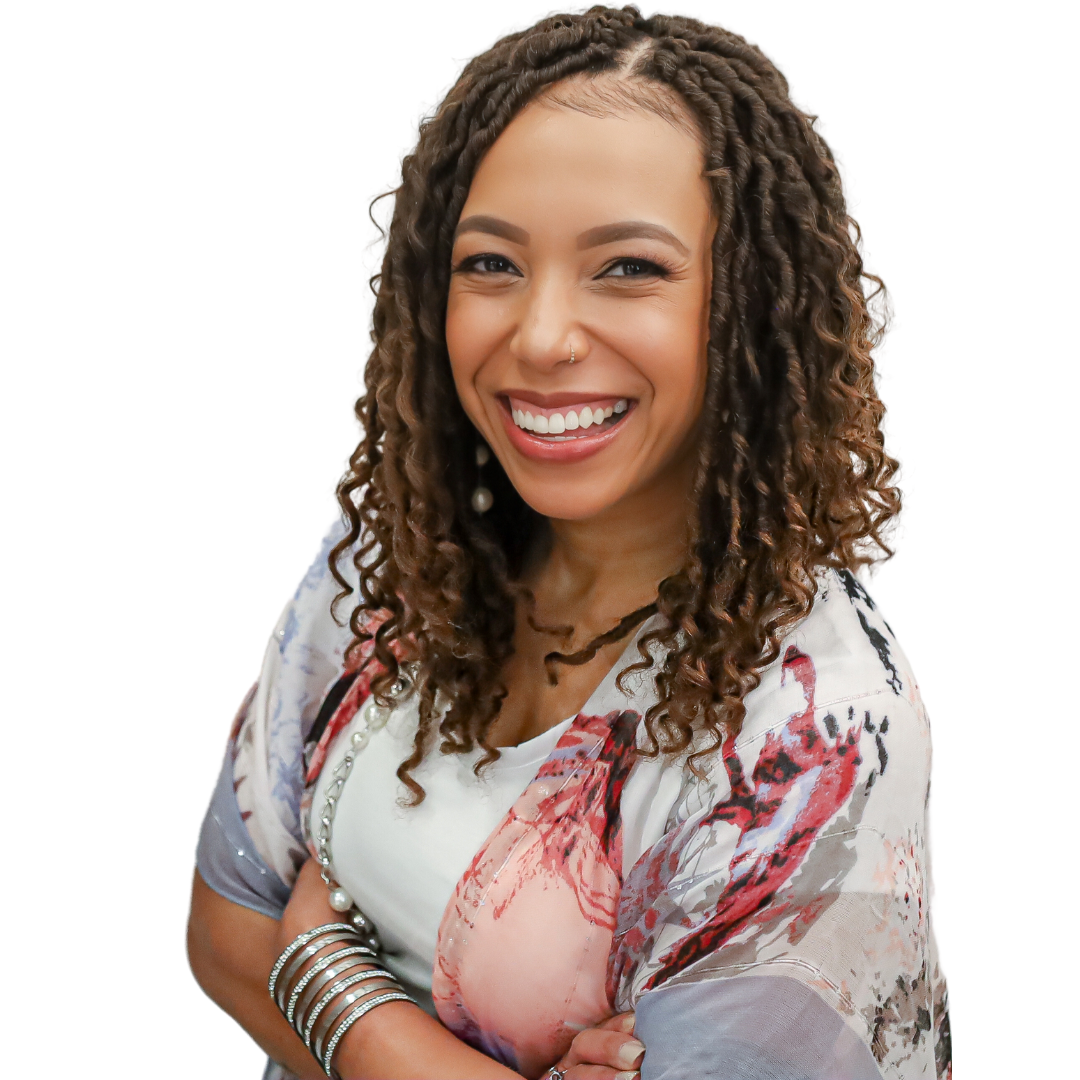The Myth of the Broke & Broken Black Family (Black Love) – with Kevin and Wanda Turpin
We’re celebrating black love on this Valentine’s Day! And I’m dispelling the myth that most black families are broke or broken. The truth is there is a resiliency and strength that is foundational to many healthy black marriages and relationships.
Today, I’m joined by one of my pastors, Kevin Turpin, and his wife, Wanda. The Turpins have been married 44 years! Below are some snippets of our conversation as we delve into what they learned from their parents’ longstanding marriages, how they overcame communication problems in their own marriage, and what they think their greatest legacy as a family is.
What Did Your Parents Teach You About Love
Dana Che: The fact that both of you guys have both of your parents. I love that because I feel like a lot of the stereotype is that all black people grew up in single parent homes and no black people grew up with their fathers. And both of you are living witnesses of the opposite,. You both grew up in families that were intact. Not perfect, I’m sure, but healthy.
Wanda: And we even grew up with our grandparents being married, that probably also, Dana, was a benefit to our marriage. I’m sure had our parents had some tough times, but you just don’t leave. You work it out. Now, there are some things harder to get over than others, but you work it out and you stick it out until hopefully it does work out and your marriage makes sense. We saw strong marriages growing up.
Black Love: Elevating Not Excluding
Dana Che: When we say black love, this is not meant to be racially exclusive. We want everyone here to feel included. But I also want to make sure that we elevate black love, especially during Black History Month. We are elevating what black love is, how resilient, how strong it is. Pastor Kevin, let me just start off by telling people we have a big value of marriage counseling and marriage coaching on this show. I know Shaun and I sat across the counseling table from you many times in our relationship, and you’ve counseled quite a lot of couples, not just in our church, but just couples in general.
Let me ask you, just kind of starting off this conversation, if you had to say, over the course of the many couples that you have counseled, what do you see as kind of the main foundational problem that a lot of couples are facing?
Couples with Communication Problems
Kevin: I would say communication on so many different levels. And part of it is not understanding the wiring of the other person or warning the other person, really, to think and to act, to make decisions the way that person makes them. And that’s impossible because there’s a book called His Brain, Her Brain. We’re wired differently in every facet. Women and men are different. That sounds trite, but it is a truth.
So what I attempt to do is to help through various tools, help couples really see how God has wired them so they can understand. Again, this took now what I can give to couples, maybe in four or five sessions, it took me half of my marriage to learn, 45 years to learn it myself. But once you come to understand, one, that you’re different, and two, you learn to appreciate those differences. That’s when you’re on a good road to healing, a good road in terms of understanding how to work with each other in unity and in harmony. So I’ll stop there, but communication is at the top.
Dana Che: All right. So let’s talk a little bit about you said. It took you, like, 20-25 years to learn. So what was going on with you and Wanda? What were the communication challenges that you were seeing in your earlier years of marriage?
Kevin: Well, in our earlier years of marriage, I came in with some unusual baggage. I was very religious, sincere in my passion for God, loved not only God, but loved the church. So much so that I did one thing. I’ll tell you this quick story. When I we were married for five years, four years before we had our first child, five years before we had our first child. And I had developed this regiment. On Friday nights, I go to church. I come home, work all day, one that works all day, become home, and I go to church because I was a musician. So at 06:00, I need to rehearse the choir, and then following that was a church service at around 08:00, so I wouldn’t get home to about nine or 10:00 that night. Okay. So when we had Kevin, I picked Wanda up. It was a Friday that she came home. We came in the house and I said, okay, sweetheart, you got everything. And guess what I did.
Dana Che: You went to church after your new baby had just been born?
Kevin: It took some time for me to live that way down, but that was an issue that was out of total ignorance, and it really sent a really bad message to her, to where she felt, okay, this is the way my life is going to be. I got to find a way I’ll stay long enough to get things stable for my son, but I don’t know if I could stand this relationship.
I didn’t have a clue, the message that I was sending. And at that time, Wanda wasn’t a big talker. She was just saying, well, if this is his life . . . she’s not that type that’s going to intrude. If that’s who you are and that’s what you want, I’m not going to interfere. So she didn’t communicate that, but I picked it up, and there’s some more to the story. But that’s when I really began to kind of understand that, no, I need to learn some things. I need to mature and need to allow her to be who she is. And not try to make her who I think she should be based upon some idealistic, religious, spiritual ideology.
Married with a Spiritual Imbalance
Dana Che: Yes. That is so good that you’re talking about that, because I do think a lot of Christian couples are dealing with that, where you’ll have kind of this imbalance in spirituality and one spouse. I mean, I was this way where I would do the whole shaming Shaun because he didn’t want to go to church and trying to make him go to all the meetings and stuff that I wanted to go to and doing the whole blame and shame game. So I think that there’s always that tendency because like you said, our intentions are good, but the way that we present it, it really just pushes the other spouse in the opposite direction.
WATCH MY VIDEO: WHEN YOUR HUSBAND DOESN’T LEAD SPIRITUALLY
Kevin: It is absolutely right. That was, for me, one of the things that I did that I learned later as I matured, that boy did that damage the relationship early on that needed some time to heal, and I had to prove it was more than words, really. You count and I really respect you. I had to demonstrate that and prove that.
Dana Che: So, Wanda, you weren’t much of a talker in those early years. Was it just kind of this idea that he’s going to do what he wants to do anyway, there’s no need or was there something else going on inside of you that you didn’t communicate, like what this was really doing to you?
Wanda: First of all, my personality is I’m an internal processor. I don’t process outwardly. And also, I wasn’t trying to compete with God. Now, when Kevin I’m going to go back a little bit. When we first started dating, he wasn’t really well, he was involved in church, don’t get me wrong, but I very much was at the top of his list. And then we get married and people say this all the time. You find out who the real person is when you get married. And I always say men like to hunt. They like to do all they can to get the prey. And then when they have the pray, they’re like, okay, so I can go back to my regular life. So this part of Kevin’s life, I really did not know how in depth he was or connected he was to the church.
What Most Black Parents Want for Their Daughters
My dad raised three girls. So I had a mom and dad all my life. I don’t know anything without a mom and dad. And my dad raised three girls. And his philosophy was, I don’t know that you’re going to get married. I hope that you find someone special, but if not, I’m going to make sure you know how to survive. So survival, I felt like, wasn’t going to be that hard for me because I kind of knew how to do it. But it was important because I already had my son, that he was connected to Kevin, even though I wasn’t really connected to Kevin. So I said, well, I’ll stay long enough so that I don’t destroy my son. I want that bond to be there between he and his dad. And I’m not going to compete with God. If God is number one in your life, then fine. And we are at the bottom. That’s where we were going to stand. So I wasn’t going to try to compete with God, but I realized later it wasn’t per se God. It was the religious environment that we were in.
Wanda: Dana, I want to say this. I think most people plan for the wedding, but they don’t plan for the marriage. And it’s very difficult. You’re taking two different, totally different personalities and trying to bring them in along with your family dynamics. And we have a great relationship with both sides of our family, which I know a lot of people don’t have, but we do have that. We were raised similar as far as morals and your love for your family, but the difference was the religion. Church was a part of our life, but it wasn’t everything in our life.
Dana Che: Wanda, you said two things that I think are and correct me if I’m wrong or if you have a different perspective, but two things I think that might be kind of unique to black culture. One, you said that your dad raised you to basically survive. He was like, I’m going to raise these girls up to be able to take care of themselves so they’re not dependent upon a man. And I find that that is something that is unique to our culture, whether you’re being raised by a single mom. I was raised by a single mom for the majority of my childhood, and that was my mom’s purpose. It’s like, you need to be able to take care of yourself. You need to be able to be independent. And not to say that our other cultures don’t teach their kids that, but I do think that there is something very unique about black culture that we want to make sure our kids are going to be all right.
They’re not going to be dependent upon anybody. And then the second thing that you said that I thought was really impactful you were talking about just kind of how you grew up and the fact that both of you guys have both of your parents. And I love that because I feel like a lot of the stereotype about blacks is that all black people grew up in single parent homes, and no black people grew up with their fathers. And both of you are living witnesses of the opposite, that you both did grow up in families that were intact, not perfect, I’m sure, but impact families.
Black Families: Legacy Leavers
Wanda: Right. And we even grew up with our grandparents being married, so there was never divorce. I didn’t see divorce until I got older and some family members that just didn’t make it. But as far as my family and our grandparents, we always saw marriage. So that probably also Dana was a benefit to our marriage, because you just don’t leave. I’m sure had some tough times, but you just don’t leave. You work it out. Now, there are some things that it’s harder to get over than others, but you work it out and you stick it out until hopefully it does work out and your marriage makes it. And we can say for both our parents, they have wonderful marriages, though. My dad died two years ago. 63 years for my parents and 72 years for Kevin’s parents.
Dana Che: Wow.
Kevin: We saw strong marriages. Not perfect, but they modeled, particularly later in life. My dad is 92 and waits on my mom hand and foot, but my mother waits on him, too. So there’s that reciprocal relationship, and now it’s sweeter than ever. God has blessed us with tremendous role models of what a marriage is.
Dana Che: You know, I came across a quote that said, black love is revolutionary. And I’ve been, like, marinating on that quote. And then one of my friends said it to me not too long ago, and she’s a single girl, and she’s like, I’m not going to settle. I’m not going to settle for just anybody. So I asked her, and I’ve been asking different people, like, what does that mean to you? Black love is revolutionary. So I want to ask you guys, what do you think about that quote? Do you agree? And if so, what does that mean to you?
To hear the rest of the conversation, be sure to listen to the full episode of the podcast!
Links Mentioned in this Episode
Grab Your Free 7 Secrets to a Happy Marriage Resource
Learn more about the Life Enrichment Center
Listen to 5 Ways to C.O.V.E.R Your Marriage in Prayer
SUBSCRIBE | SHARE | RATE | COMMENT
To ensure you never miss an episode, be sure to subscribe on Apple Podcasts, Google Play, Spotify, Stitcher, iHeart Radio, or wherever you listen to podcasts. Remember, sharing is caring! So, share these episodes with your friends and family via email or social media.




0 Comments